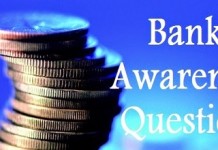Hello Aspirants,
Welcome to Banking Awareness Quiz in AffairsCloud.com. Here we are creating quiz covering important questions which are common for all the bank exams and other competitive exams.
- The safest form of Crossed Cheque is _____
A. Double Crossing
B. General Crossing
C. Special Crossing
D. Account payee crossing
E. None of the AboveD. Account payee crossing
Explanation:
In Account payee crossing the amount will not be paid to anybody over the counter. It will be credited to the account of the payee only. Thus account payee crossing ensures safe transfer of funds. - _______ is a cheque that is not crossed on the left corner and payable at the counter of the drawee bank on presentation of the cheque.
A. Crossed Cheque
B. Open Cheque
C. General Crossing
D. Restrictive Crossing
E. None of the AboveB. Open Cheque
Explanation:
An open cheque is a cheque that is not crossed on the left corner and payable at the counter of the drawee bank on presentation of the cheque. - The words ‘not negotiable’ can be added to _______
A. Double Crossing
B. General Crossing
C. Special Crossing
D. Both (B) and (C)
E. Both (A) and (B)D. Both (B) and (C)
Explanation:
The words ‘not negotiable’ can be added to general-crossing as well as special-crossing and a crossing with these words is known as not negotiable crossing. The effect of such a crossing is that it removes the most important characteristic of a negotiable instrument. - Which of the following endorsements is not valid?
A. Restrictive Endorsement
B. Partial Endorsement
C. Conditional Endorsement
D. Facultative Endorsement
E. Both (A) and (B)B. Partial Endorsement
Explanation:
If the bill purposes to be endorsed for a part of the amount payable, the endorsement is called partial. It is legally ineffective. - If the endorsement makes the payment of a bill subject to the fulfilment of a condition the endorsement is called _______
A. Restrictive Endorsement
B. Partial Endorsement
C. Conditional Endorsement
D. Facultative Endorsement
E. Both (A) and (B)C. Conditional Endorsement
Explanation:
If the endorsement makes the payment of a bill subject to the fulfilment of a condition the endorsement is called Conditional Endorsement. - Which of the following endorsement specifies the name of the transferee for the payment of the bill?
A. Restrictive Endorsement
B. Partial Endorsement
C. Conditional Endorsement
D. Facultative Endorsement
E. Special EndorsementE. Special Endorsement
Explanation:
An endorsement which specifies the name of the transferee for the payment of the bill is called special endorsement. - If the endorser signs, but does not give his/her name to whom he/she wishes to transfer the cheque is called _________
A. Restrictive Endorsement
B. Partial Endorsement
C. Conditional Endorsement
D. Facultative Endorsement
E. Blank EndorsementE. Blank Endorsement
Explanation:
If the endorser signs, but does not give his name to whom he wishes to transfer the cheque is called Blank Endorsement. - When an endorsee give up some of his/her rights then it is called __________
A. Restrictive Endorsement
B. Partial Endorsement
C. Conditional Endorsement
D. Facultative Endorsement
E. Blank EndorsementD. Facultative Endorsement
Explanation:
When notice of dishonour is received by the endorsee instead of endorser it is known as facultative endorsement. - The endorser expresses that he/she would not be liable for any expenses incurred by endorsee or any holder, in case of dishonour of the instrument the endorsement is called __________
A. Restrictive Endorsement
B. Partial Endorsement
C. Conditional Endorsement
D. Facultative Endorsement
E. Sans recourse EndorsementE. Sans recourse Endorsement
Explanation:
The endorser expresses that he would not be liable for any expenses incurred by endorsee or any holder, in case of dishonour of the instrument the endorsement is called Sans recourse Endorsement. - Which of the following is an endorsement that restrict the further negotiation of the bill?
A. Restrictive Endorsement
B. Partial Endorsement
C. Conditional Endorsement
D. Facultative Endorsement
E. Sans recourse EndorsementA. Restrictive Endorsement
Explanation:
An endorsement which restrict the further negotiation of the bill.
AffairsCloud Recommends Oliveboard Mock Test
AffairsCloud Ebook - Support Us to Grow
Govt Jobs by Category
Bank Jobs Notification


